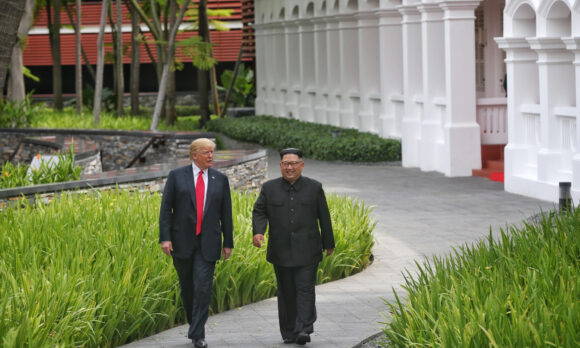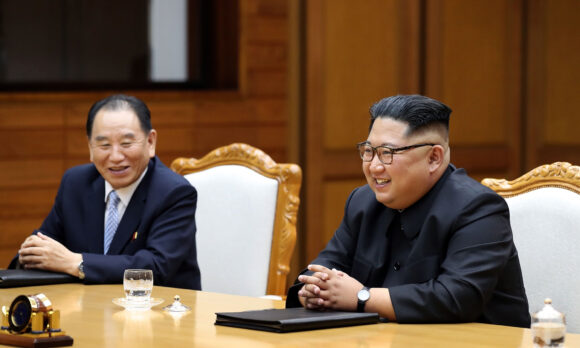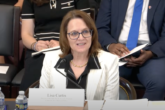December 09, 2020
Sharper: North Korea
Analysis from CNAS experts on the most critical challenges for U.S. foreign policy.
For decades, North Korea's authoritarian dictatorship has threatened Northeast Asia's regional stability, challenged U.S. interests, and subjected its own citizens to an unparalleled generations-long human rights crisis. Pyongyang's illicit pursuit of a nuclear weapons arsenal is just one example of the regime's efforts to destabilize the region and threaten the security of the United States, its allies, and partners. CNAS experts are sharpening the conversation about how to manage the challenges to U.S. interests the North Korean regime poses. Continue reading this edition of Sharper to explore their ideas and recommendations.
Reports
Exposing the Financial Footprints of North Korea’s Hackers
“North Korea conducts intricate and sweeping cyberattacks against the United States and its allies to acquire funds to support its illicit nuclear proliferation efforts,” Jason Bartlett warns in a CNAS policy brief. “North Korea’s malicious cyber activities are a direct threat not only to U.S. national interests, but also to global security and the integrity of the entire international financial system.”
Renew, Elevate, Modernize: A Blueprint for a 21st-Century U.S.-ROK Alliance Strategy
In a CNAS report featuring a foreword by Ambassador Mark Lippert (Ret.), authors Kristine Lee, Joshua Fitt, and Coby Goldberg explore how the Biden administration can reinvigorate the crucial alliance between the United States and South Korea. As Seoul adopts globally oriented policies, buoyed by its position at the leading edge of several technology areas and its successful COVID-19 pandemic response, the United States should parlay these efforts into a more concrete role for South Korea as a partner on the world stage.
Risk Realism
For a generation, policymakers judged that a nuclear North Korea was a threat the United States could not accept. To decide otherwise, it was thought, would imperil U.S. allies, increase the proliferation of nuclear weapons, damage the sanctity of the nuclear taboo, and eventually threaten U.S. territory. In a CNAS report, Van Jackson argues that although a non-nuclear North Korea is ideal for the national interest, it is no longer realistic for the near-term future, and continuing to pursue this objective is neither cost- nor risk-free.
Exposing the Financial Footprints of North Korea’s Hackers
How North Korea conducts intricate and sweeping cyberattacks against the United States and its allies to acquire funds to support its illicit nuclear proliferation efforts....
Renew, Elevate, Modernize: A Blueprint for a 21st-Century U.S.-ROK Alliance Strategy
The U.S.-South Korean alliance has the potential to play a central role in bolstering a rules-based order in the Indo-Pacific region and beyond....
Risk Realism
In a new report, Dr. Van Jackson argues that while pursuing North Korean denuclearization is ideal for U.S. national interests, it is no longer realistic for the near-term fut...
Commentary
North Korea Needs to Extort Democracies to Survive
As Pyongyang revisits an old playbook, Washington should also return to the fundamentals that undergird U.S. policy in Northeast Asia—that is, alliance management," Kristine Lee writes in Foreign Policy. "As North Korea probes for new pressure points in the U.S.-South Korea alliance, it has never been more imperative that Washington carefully steward its ties with Seoul."
Busting North Korea’s Sanctions Evasion
"North Korea is the most sophisticated, creative, and dangerous actor when it comes to stealthy and skillful methods of financing illicit nuclear and missile proliferation," Elizabeth Rosenberg and Neil Bhatiya warn in a CNAS commentary. "While North Korea’s Supreme Leader has outwardly professed a desire for reduced tensions on the Korean peninsula and a new relationship with the United States, he has overseen a vast criminal enterprise unrivaled in its efforts to evade financial controls, primarily financial sanctions, meant to limit North Korea’s access to funds for bomb building."
North Korea Needs to Extort Democracies to Survive
Pyongyang has made clear this week that its patience for business as usual with Washington and Seoul is wearing thin. Cutting off all official communication lines, including m...
Busting North Korea’s Sanctions Evasion
North Korea is the most sophisticated, creative, and dangerous actor when it comes to stealthy and skillful methods of financing illicit nuclear and missile proliferation. Whi...
Do Not Forget Korean-Americans With Family Stuck in North Korea
Expert Joshua Fitt writes in The National Interest, "The 70th anniversary of the North Korean invasion south of the 38th parallel also marks seventy painful years since now elderly siblings, spouses, and parents last saw each other. The current status quo’s inertia suggests that North and South Korea can remain divided far beyond anniversaries and longer than the average life expectancies on the peninsula, but the aging members of divided families cannot."
Why Is North Korea So Good at Cybercrime?
"Despite U.S. and U.N. sanctions designed to stop the illicit financing of nuclear weapons, North Korea continues to baffle the world with its unprecedented success in sanctions evasions and cybercrime. As countries scramble to find consensus on cybersecurity protocols, North Korea has moved quickly to expand its cyber capabilities both at home and abroad," Jason Bartlett writes in The Diplomat.
Do Not Forget Korean-Americans With Family Stuck in North Korea
It is important to reflect on the still-divided families which have suffered for decades and for whom time is running out....
Why Is North Korea So Good at Cybercrime?
North Korea continues to exploit vulnerabilities in cybersecurity to acquire funds for its dangerous nuclear weapons development program....
Breakthrough or Crisis? How Will Coronavirus Impact Tensions with North Korea?
"The virus has worsened existing geopolitical rifts among Northeast Asian countries, which will also overshadow or interrupt attention to the North Korean nuclear issue," Duyeon Kim observes in The National Interest. "The virus is also exacerbating domestic political battles in South Korea, the U.S., and Japan that will further consume leaders’ attention. These strains will make policy coordination and consultation even more difficult among key countries, let alone face-to-face meetings because of viral infection and transmission concerns.
Confronting Reality: The Bitter Medicine That North Korea Policy Needs Now
"If eliminating North Korea’s nuclear and missile arsenal is the ultimate benchmark for success, then the United States lost as early as 2006, when North Korea first detonated a nuclear device," Van Jackson argues in War on the Rocks. "What I prescribe takes a clear-eyed view of what has the best chance of working. Only through a more realistic North Korea policy can the United States do what matters most — manage the risks of nuclear and conventional war."
Breakthrough or Crisis? How Will Coronavirus Impact Tensions with North Korea?
The novel coronavirus pandemic has accelerated geopolitical tensions first in Northeast Asia, with the original outbreak in China, and now around the world as the United State...
Confronting Reality: The Bitter Medicine That North Korea Policy Needs Now
My entire career, I’ve watched policy officials make the well-intentioned choice to seek North Korean denuclearization. In the early 2000s, it was a smart and necessary goal. ...
In the News
Featuring commentary and analysis by Duyeon Kim, Kristine Lee, and Van Jackson
Trump will leave office foiled by the North Korea nuclear problem. Will Biden fare better?
President Trump’s cool-headed nuclear envoy told the North Koreans it was “a window of opportunity.” Here was a U.S. president willing to venture far outside traditional diplo...
North Korea Promises to Advance Nuclear Weapons as It Turns Back to Foreign Affairs
North Korea, on the second anniversary of the historic Singapore summit between Kim Jong Un and President Trump, said relations with the U.S. had “shifted into despair” and pr...
US policy toward North Korea under Joe Biden: pageantry out, pragmatism in
US President Donald Trump’s unorthodox approach to North Korea saw him threaten “fire and fury” and ramp up sanctions, then meet dictator Kim Jong-un and exchange “beautiful” ...
Thank you for registering! You will receive a confirmation email shortly. All CNAS events are free, open to the public, and viewable from cnas.org/live.
Stay up-to-date with report releases, events, major updates, and announcements from the Center for a New American Security.
More from CNAS
-
Transatlantic Security / Middle East Security / Energy, Economics & Security
Sanctions Aren’t Enough to Shut Down the Moscow-Tehran Black Market for WarThe geographic scope and extent of Iranian-Russian cooperation highlights the failure of traditional sanctions to prevent Moscow and Tehran from seeking key components like ch...
By Delaney Soliday
-
Assessing the Terror Threat Landscape in South and Central Asia and Examining Opportunities for Cooperation
Watch...
By Lisa Curtis
-
Since Russia Invaded Ukraine, Allies Levied More Than 11,000 Sanctions on Russia
NPR's Leila Fadel talks to Rachel Ziemba of the Center for a New American Security about sanctions which have failed to dramatically weaken Russia's economy, and its ability t...
By Rachel Ziemba
-
A Tool of Attrition
Sanctions are more of a marathon than a sprint, and the long-term picture looks much more promising than the short-term one....
By Edward Fishman















